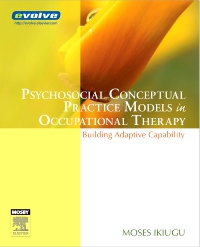Psychosocial Conceptual Practice Models in Occupational Therapy - Elsevier eBook on VitalSource, 1st Edition
by Moses N. Ikiugu, PhD, OTR
Elsevier eBook on VitalSource
ISBN:
9780323062503
Copyright:
2007
Publication Date:
01-25-2007
Page Count:
512
Imprint:
Mosby
List Price:
$66.99
Or $0.00 with a valid access code
This book examines the occupational therapy paradigm (its focal viewpoint, core constructs, and values) as well as the role of complexity/chaos theory as a scientific framework for occupational therapy research and practice. Unlike other current OT texts, this book uses clinical case examples to illustrate application of proposed changes to make procedures consistent with the latest Occupational Therapy Practice Framework. The reader walks away with a clear grasp of the theoretical principles guiding his or her treatment interventions, the explanations behind those principles, and the applicable intervention for said techniques and procedures.
-
-
- An emphasis on clinical-reasoning skills, including information on different types of reasoning skills as well as the MAPP model of teaching helps the student and clinician translate theoretical principles into practice.
- The section on specific interventions addresses each of the conceptual practice models according to a consistent chapter template, which enables the reader to apply conceptual practice models in real-world contexts.
-
- Preview questions at the beginning of each chapter alert the reader to important concepts in the upcoming text.
- Critical analysis of the theoretical core provides suggested modifications to increase consistency with the new occupational therapy paradigm.
-
Part I: Background
1. Formal Therapeutic Use of Occupations: The Moral Treatment and Arts and Crafts Movements
2. Formal Founding of Occupational Therapy and its Evolution from 1900 to the Present
3. Psychological Theories that have Contributed to the Development of Occupational Therapy Practice
Part II: Contemporary Conceptual Foundations of Psychosocial Occupational Therapy
4. The Occupational Therapy Paradigm
Part III: General Practice Considerations in Psychosocial Occupational Therapy
5. Client Evaluation
6. Clinical Reasoning: Goal Setting and Treatment Planning
7. Intervention
Part IV: Specific Intervention: Application of Conceptual Practice Models
8. Instrumentalism in Occupational Therapy
9. Psychodynamic Model
10. Behavioral/Cognitive-Behavioral Conceptual Model of Practice
11. Cognitive Disabilities Model
12. The Model of Human Occupation (MOHO)
13. The Sensory Processing/Motor Learning (SP/ML) Conceptual Practice Model
14. The Developmental Conceptual Model of Practice
15. Occupational Adaptation (OA) Model
16. The Canadian Model of Occupational Performance (CMOP)
17. Integrating Conceptual Models of Practice
Part V: Application of Psychosocial Occupational Therapy across the Continuum of Care
18. Psychosocial Occupational Therapy across Ages
19. Expanded Psychosocial Occupational Therapy Practice
20. Occupational Therapy for Clients Suffering from Substance Abuse
21. Integration of Care-Giver Issues in Psychosocial Occupational Therapy Intervention
22. Community-Based Occupational Therapy Intervention
Laboratory Manual
1. Introduction
Part I: Application of the Occupational Therapy Paradigm: Gathering and Interpreting Information, and using Clinical Reasoning Skills to Identify Occupational Performance Issues and Plan Interventions
2. Getting Grounded on the Rich Occupational Therapy Heritage
3. Medical Chart Review
4. Meeting the Client and Conducting an Initial Interview
5. Interpreting Gathered Information
6. Clinical Application of Psychological Constructs
7. Clinical Reasoning
Part II: General Intervention Skills
8. Ethical Decision Making, Use of therapeutic Relationship, Meaningful Occupations, Groups and Group Processes, and Cultural Issues in Therapy
9. Record Keeping and Discharge Planning
Part III: Specific Interventions: Application of Conceptual Practice Models
11. Instrumentalism in Occupational Therapy
12. The Psychodynamic Conceptual Practice Model
13. The Behavioral/Cognitive-Behavioral Conceptual Practice Model
14. Cognitive Disabilities Model
15. The Model of Human Occupation
16. The Sensory Processing/Motor Learning (SP/ML) Conceptual Practice Model
17. The Developmental Conceptual Model of Practice
18. The Occupational Adaptation Conceptual Model of Practice
19. The Canadian Model of Occupational Performance
20. Integrating Conceptual Models of Practice
Part IV: Occupational Therapy in the Continuum of Care
21. Occupational Therapy for all Ages
22. Expanded Psychosocial Occupational Therapy Practice
23. Occupational Therapy for Clients Suffering from Substance Abuse Problems
24. Integration of Caregiver Issues in Psychosocial Occupational Therapy Intervention
25. Expanding your Horizons: Community-Based Occupational Therapy
Appendix: Vocabulary of Affective Adjectives
-
Moses N. Ikiugu, PhD, OTR, Associate Professor and Director of Occupational Therapy Research, University of South Dakota, Division of Health Sciences, Department of Occupational Therapy, Vermillion, SD, USA




 as described in our
as described in our 